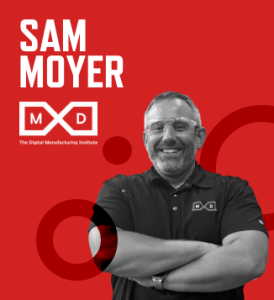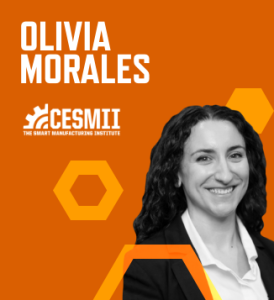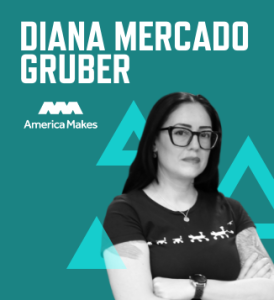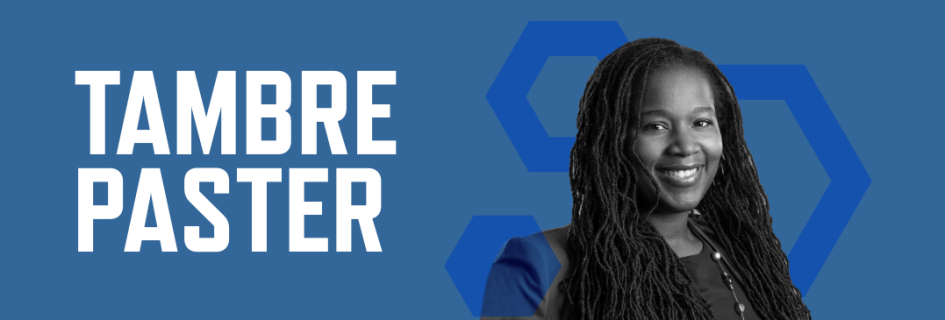
Tech wizard, lifelong learner, beach lover
Tambre Paster’s initial interest in manufacturing dates to a seventh-grade field trip to NASA in Houston, TX, where she marveled at how heavy machinery could be flown with pinpoint precision faster than the speed of sound.
Her curiosity has led her to a fascinating career in which she is now a Associate Technical Fellow at Lockheed Martin. The title of Technical Fellow at a Fortune 100 company is highly prestigious and reserved for the most senior and accomplished technical experts within an organization who can provide thought leadership and contribute to high-level strategic decisions.
Lockheed Martin is a member of CyManII, the Cybersecurity Manufacturing Innovation Institute, (and several other Manufacturing USA institutes). CyManII is dedicated to cybersecurity in manufacturing. The manufacturing industry’s rapid transition to digital technology and its critical role in the economy make it a prime target for cybercriminals.
Tambre has spearheaded Lockheed Martin’s workforce efforts with CyManII and helped provide data and context to understand the needs of their Tier 2 and 3 suppliers. She recently moved from a role in Cybersecurity Engineering to Supply Chain Risk Management, where she will develop Lockheed Martin’s strategy for driving resilience into its supply chains. Tambre is currently pursuing her Doctorate. For being inspiring to all who come in contact with her about advanced manufacturing, Tambre Paster is a Modern Maker.
Q&A with Tambre
How did you find your way to working in advanced manufacturing?
I’ve had the opportunity to work in this industry my entire career. Since my seventh-grade visit to NASA in Houston, I have always marveled at the collective good that many people working together could accomplish. We unlock the secrets of the universe, fly heavy machinery through the air with pinpoint precision, and travel faster than sound itself!


What is the best part of your job?
The most challenging part of my job is also the best part! In response to evolving threats, vulnerabilities, and a regulatory environment, we are constantly developing new strategies and pushing the envelope with new technologies and approaches. This creates exciting, new opportunities to make meaningful contributions to our organization, mission, and world.
What would people be surprised to learn about manufacturing or your role in it?
People would be surprised by the diversity of skills and interests required for any manufacturing organization to succeed. We need technical skills and soft skills, folks with deep knowledge, and those who can integrate functionally. We rely on individuals with repeatable know-how and those willing to take on new, ambiguous challenges. We need folks who can focus internally and others who can think globally. We need a variety of perspectives and opinions.
What advice do you have for someone new to the industry?
For anyone who is new in any industry, I recommend you find a mentor to help showcase career possibilities and to help you find the intersection between your strengths and your passion. Mentors can help you navigate roadblocks and provide in-depth perspectives on important matters. Don’t travel the journey alone.
What makes you excited to go to work?
I am motivated by a strong sense of purpose. I am inspired and focused knowing that what I contribute matters and impacts team and mission success.
What are the three most important skills for your job?
Here are the most important skills I did NOT learn in school:
- Collaboration: We can accomplish great things when many work as one. It takes great effort, skills, and intention to communicate a vision, rally stakeholders to coalesce around a single strategy, and execute toward the intended outcome. It takes a diversity of thought and backgrounds to accomplish complex goals, which means that being collaborative is a crucial ingredient for success.
- Agility: The only constant is change. In my 21-year career, there’s been no shortage of opportunities to meet technological challenges, align with regulatory or market dynamics, or optimize our business practices for growth. This requires change agents ready and willing to use their knowledge, network, and growth mindset to charter new territory.
- Resilience: Success is not a straight line. Those who retreat at the first sight of a setback are likely to accomplish little. Those who view setbacks as learning opportunities are poised to travel that winding road to success.
If you didn’t have to work, how would you spend your day?
My days would be centered around quality time with loved ones (on the beach), philanthropy (somehow associated with the beach), and teaching at a university (preferably by a beach).
What activity gives you the most energy?
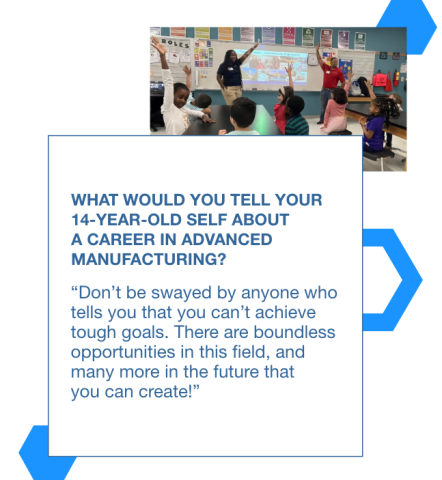
It’s so tough to choose just one. Here are my top two:
- Strategy and execution in unchartered territory energizes me. I love dreaming up big ideas while systematically taking calculated steps to reach those goals.
- Mentoring is a passion of mine. I love showing others what’s possible and helping others arrive at their future. STEM outreach is a fulfilling activity for me. I know how much it means to have positive role models, so I show up as often as I can to lead or support K-12 and university-level initiatives.
What hobbies make you better at your career?
Playing flute was my first passion in life, and I almost made it my career. It has taught me the value of trying difficult things, working effectively with a team, competing with myself to be just a little better each day, and the joy of sharing gifts with others.
How does the work you do impact the world?
The work I do helps forge the path to protect our men and women on the front lines of conflict and America’s interest in the world.


